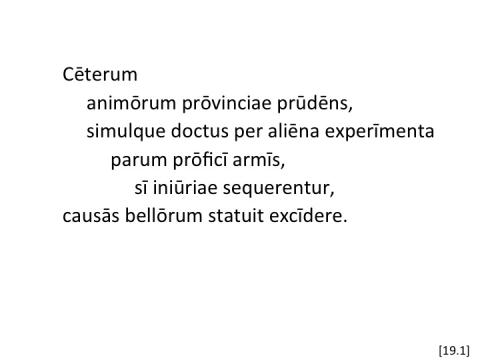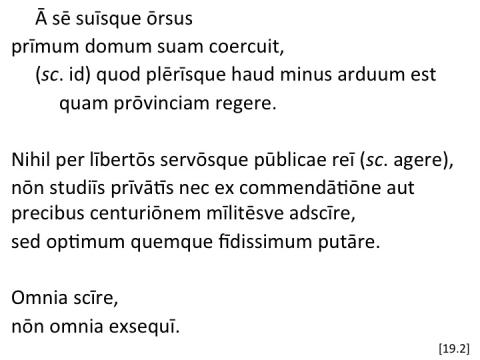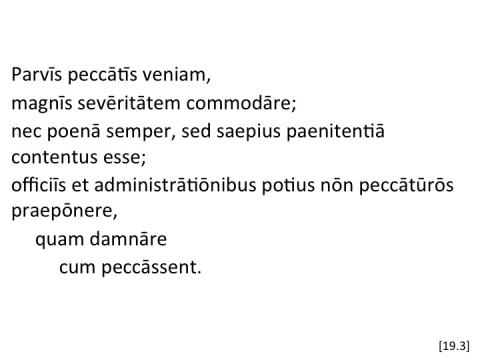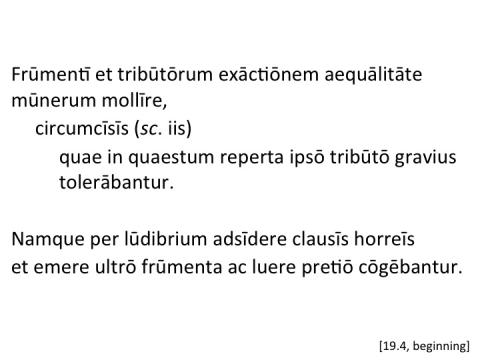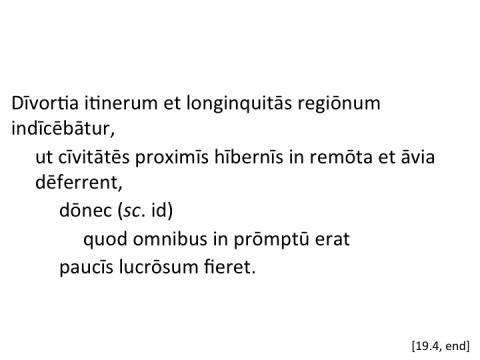Overview: Agricola introduces reforms in the administration of civil affairs; promotions are not governed by favoritism; he tempers justice with mercy; abuses in the collection of imposts are corrected. (Stuart); this chapter begins on f. 57v of the codex Aesinas.
19.1
cēterum: see note on 11.1. (Pearce)
animōrum ... prūdēns: “well acquainted with the temper.” (Gudeman)
doctus per aliēna experīmenta: “taught by the experience of others.” ... For the meaning of experimentum, see note ch. 16.3. (Gudeman)
causās: the insolence and the rapacity of the Roman officials. See ch. 15. (Stuart)
excīdere: “remove, eradicate.” ... Surgical or medical metaphors are comparatively rare in Tacitus and elsewhere in Latin, except in Cicero, who had a peculiar fondness for them. (Gudeman)
19.2
ōrsus ... coercuit = ōrsus est et coercuit. Orsus is not past with reference to coercuit, but with reference to the time at which Tacitus wrote. (Pearce) [A&G 491]
domum: "his official household." (Stuart); i.e. his household subordinates. (Pearce)
nihil: supply agere. (Stuart); the language is very compressed here. Tacitus means, “Agricola did not employ freedmen in the public service, but soldiers, and these he chose with discretion.” The reference is to the employment of privileged soldiers (beneficiarii) in the lower branches of the public service. (Pearce); such ellipses of a verb of doing or acting, though not unusual, are particularly frequent in Tacitus. See Introd. p. xxxi, #6. (Gudeman)
publicae rei: “public business.” So again Germ. 13.1. In this sense, the adjective must precede, because rēs publica always has its restricted political meaning, but in other combinations with rēs in Tacitus, the attribute as a rule follows the noun. See Introd. p. xxvi, #3. (Gudeman)
mīlitēs ... adscīre: “attach soldiers to his retinue.” These were the beneficiāriī so called, soldiers who were excused from ordinary military duties and attached to the staff of an official in a clerical capacity or for some petty service of administration. (Stuart)
adscīre sed optimum ... putāre = adscīre sed optimum ... adscīre quia eum ... putābat. On the prolepsis, see Introd. p. xxx, #20. (Gudeman) optimum quemque fīdissimum putāre: Woodman suggests that we supply fore here rather than a proleptic adscīre. (Lahiri)
exsequī: “punish.” (Stuart); “to follow up,” i.e. “to punish.” (Pearce); i.e. while he kept himself informed of everything, he did not always act upon this knowledge. The word, as shown by poena below, cannot here signify to punish, a meaning, moreover, not found elsewhere in Tacitus, though common in Livy. With the statement itself, compare Introd. p. xii note 24. (Gudeman)
19.3
commodāre = praebēre, "he employs." (Stuart); the verb has the idea of adaptation. Tr. “to mete out.” (Pearce); = adhibēre. In this sense the verb seems not to occur elsewhere. See Introd. p. xxxvii, j. (Gudeman)
poenā: loosely joined to contentus, which is more appropriate to paenitentia; "he does not always resort to punishment." (Stuart) nec poenā ... contentus esse: "he considered satisfaction attained not always by punishment, but more often by repentance." Observe the alliterative antithesis, on which see Introd. p. xxviii, #13. (Gudeman)
officiīs et administrātiōnibus: "official functions." Hendiadys. (Gudeman)
nōn peccātūrōs: used as substantive, “men who were not likely to go wrong.” (Pearce)
cum peccāssent: subjunctive of repeated action; see note on ubi ... poscerent, 9.3. (Pearce) [A&G 518c]; the iterative subjunctive ... is extremely rare in pre-Augustan Latin. It becomes more frequent in Livy and Tacitus. (Gudeman)
19.4
frūmentī et tribūtōrum exāctiōnem: Agricola's measures of reform applied both to the requisition of grain and to the money tribute levied in Britain. Only the flagrant abuses connected with the former are here described. (Stuart); "the irksome impost of corn-taxes." (Gudeman)
aequālitāte mūnerum: he adapted his assessment to the pro rata resources of a district. (Stuart) mūnerum: i.e. those just mentioned, viz. corn contributions and direct taxation. (Pearce) aequālitāte mūnerum mollīre: “he endeavored to alleviate, etc., by an equalization of the burdens,” i.e. the same amount of corn was not demanded in those regions, which were relatively poor in corn production, some other tax being substituted. On the accumulation of the historical infinitives, eight in all, see note 5.1. (Gudeman)
circumcīsīs, etc.: doing away with the schemes devised for extortion, viz. by former legates. In what these consisted, is explained in the following. (Gudeman)
quae ... tolerābantur: the whole substantival clause is subject of the ablative absolute phrase. (Pearce) [A&G 419b]
namque ... cōgēbantur: this sentence describes the schemes by which the Roman officials utilized the grain impost as a means of extortion. When the people of a district were unable to furnish enough grain to meet the requisition, they were compelled to go through the form of buying from the Roman granaries a quantity sufficient to make good the deficit. As it would have been necessary to redeliver immediately, the grain purchased was not moved from its place. The Romans kept both grain and money. (Stuart) namque, etc.: explains in quaestum reperta. (Pearce) namque, etc.: the meaning of this much disputed passage seems to be this: In the districts poor in corn, the people were, as if in mockery, compelled to sit before the filled granaries which were not opened for them, but they were forced to buy provisions at a fancy price imposed by the covetous procurator; where there was plenty of corn, they were expected to carry their contributions to remote places, though a camp was in the immediate neighborhood. They were thus often induced to purchase exemption from so troublesome a task, the money going into the pockets of the officials. (Gudeman)
ultrō: besides being required to appear at the granaries and wait the convenience of the Romans they likewise had to buy. The Romans fixed the price. (Stuart); "into the bargain." (Gudeman)
luere pretiō: "discharge their obligations with a money payment." (Stuart)
dīvortia: elsewhere in the sense of the forks of a road; here, "roundabout ways, detours." (Stuart); a second hardship. Where the corn was readily forthcoming from the Britons, the extra profit was made by ordering it to be delivered at some inaccessible place, and then taking money for an "accommodation" more to the convenience of the Britons. (Pearce); "out-of-the-way roads." ... itinerum with dēvortia is superfluous, but it is added to balance regionum, the two terms corresponding chiastically to remota and avia below. On the singular predicate, see note ch. 4.6. (Gudeman) dīvortia: the difference between dīvortia and dēvortia is a matter of spelling, not meaning. (Damon)
longinquitās regiōnum: "remote districts"; further explained by the ut-clause. By making the delivery of the grain as difficult as possible, the Romans tempted the provincials to substitute for the contribution of grain a cash payment at a high rate. This "dodge" was practiced by Verres, the notorious praetor of Sicily, prosecuted by Cicero. (Stuart)
ut … dēferrent: in effect, a substantive clause in apposition to dīvortia and longinquitās, i.e., “namely, that the communities were transporting (sc. grain) into remote and untrodden regions, despite winter quarters being nearby.” (McKeon)
proximīs hībernīs: the ablative absolute is concessive. (Stuart) [A&G 420.3]; “though the winter-quarters of the troops (for whom the corn was required) were quite near at hand.” (Pearce)
quod omnibus in prōmptū erat: i.e. the corn, which was abundant for all, but was made a source of profit for a few. (Pearce); i.e. what was the poor man's only available commodity became a source of profit to a few officials. (Gudeman)
paucīs: the Roman officials. (Stuart)

